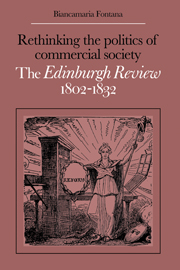Book contents
- Frontmatter
- Contents
- Preface
- Introduction
- 1 Scottish theories of commercial society and the French revolution
- 2 Adam Smith's heritage: the Edinburgh reviewers and the Wealth of Nations
- 3 The definition of political economy: political economy as a social science
- 4 The Edinburgh reviewers and the Whig party
- 5 Commercial society and its enemies: the debate on the First Reform Bill
- Conclusion
- Notes
- Bibliography
- Index
4 - The Edinburgh reviewers and the Whig party
Published online by Cambridge University Press: 14 January 2010
- Frontmatter
- Contents
- Preface
- Introduction
- 1 Scottish theories of commercial society and the French revolution
- 2 Adam Smith's heritage: the Edinburgh reviewers and the Wealth of Nations
- 3 The definition of political economy: political economy as a social science
- 4 The Edinburgh reviewers and the Whig party
- 5 Commercial society and its enemies: the debate on the First Reform Bill
- Conclusion
- Notes
- Bibliography
- Index
Summary
Political economy and party politics
In the concluding section of Chapter 1 we suggested that the reviewers' conception of the science of politics had many theoretical similarities to that outlined in the writings of Hume, Millar and Stewart. We indicated at the same time that the experience of the French revolution had resulted in the aspiration – deeply felt by many in the reviewers' generation – to a more direct participation in party politics; and we mentioned the influence of Burke's notion of politics as a skill and a profession on the reviewers' attitudes towards politics (see above pp.40–5).
Among the early contributors to the Edinburgh Review, two in particular became ‘professional’ politicians and took their seats in Parliament as representatives of the Whig party: Francis Horner and Henry Brougham. Their respective personalities and careers differed strikingly: Horner died in 1817, having exercised only a marginal influence on the fortunes of the party he had served. But Brougham lived to become not only one of the most controversial but also one of the most versatile and dominating political figures of his time.
If their achievements were unequal, their political experiences in many respects run parallel with one another. Their background and education were very similar (they had been childhood playmates and attended the same school in Edinburgh). And both (Brougham with some arrière-pensées) chose the Whig party and promoted, amongst the members of the Edinburgh Review grouping, the most progressive and liberal political line.
- Type
- Chapter
- Information
- Rethinking the Politics of Commercial SocietyThe Edinburgh Review 1802–1832, pp. 112 - 146Publisher: Cambridge University PressPrint publication year: 1985

